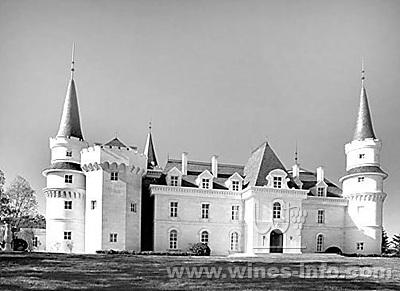乔纳森·雷,曾任英国皇家品酒师,亦是英国著名日报《每日电讯》的葡萄酒专栏作家。2007年底,他访问了张裕爱斐堡国际酒庄,张裕百年的悠久历史与顶级的葡萄酒给他留下了深刻印象。他预言,中国葡萄酒业必将崛起于世界葡萄酒业之林。
如今,这个预言正逐步实现。据权 威的全球调研机构英国CANADEAN公司公布的《2007年的饮料市场研究报告》显示,张裕集团已成功位居全球第10位。
从北京开车出来有一个小时了。
突然间,透过一片树林,张裕爱斐堡国际酒庄挺立在眼前,宛如卢瓦尔河谷的城堡。
我的旅伴,奥地利酒商伦兹·摩塞尔打了一个吃惊的口哨:“我看过这个地方的照片,但我没想到有这样的规模。”

张裕爱斐堡国际酒庄
我们所参观的北京张裕爱斐堡国际酒庄已于去年6月份正式开业,是张裕公司的四大酒庄之一。张裕公司于1892年由张弼士先生创建,是中国规模最大、历史最悠久的葡萄酒生产商之一。
在张裕的出口经理谭小姐的引导下,我们穿过城堡主楼宽阔的大理石大厅,她以骄傲的神情向我们介绍了酿酒车间。面对如此先进的酿酒设备,摩塞尔感叹道:“这正是欧洲酿酒师们梦寐以求的设备。”随后,我们还参观了酒窖、品酒室和葡萄酒博物馆。
“我们生产红葡萄酒、白葡萄酒、起泡葡萄酒(用‘香槟法’生产)、冰酒以及白兰地。”谭小姐说,“我们的宗旨是和国际葡萄酒公司竞争,以质量取胜,为祖国和人民争光。”
据了解,张裕爱斐堡国际酒庄具有四大功能,除酿酒外,还提供一流的时尚酒庄旅游服务,并以高贵优雅的休闲方式招待政界商界巨子、外国友人,以及那些懂得享受生活的高级白领。
我们品尝了张裕爱斐堡国际酒庄的葡萄酒——两款干红、一款干白,此外还有一款张裕黄金冰谷冰酒,彩龙干红、干白各一款。通过摩塞尔的渠道,这些酒已经进入了英国的销售市场。
两款彩龙葡萄酒令人惊喜,干红果香浓郁,干白清新爽口,都非常好喝。
2004年份的爱斐堡霞多丽干白相当不错,有蜂蜜和黄油果的气息,余韵令人愉悦。
我们还品尝了2002年份的大师级爱斐堡干红,100%赤霞珠酿造,是酒庄生产的顶级葡萄酒,口感非常棒,有可口的黑醋栗和强烈的樱桃果味道,余韵微涩。
2002年份的特选级爱斐堡赤霞珠干红令人击掌叫绝,它有黑醋栗果实的饱满香味和杉木香气,令人着迷,给我留下了深刻印象。该酒在法国橡木桶中陈酿,具有地道的波尔多风格,希望有机会在国际性的盲品会上展示它的风味。
张裕黄金冰谷冰酒由威代尔葡萄酿制而成,甘美而新鲜,令人欣喜万分。如果不是德国人,而是加拿大人,一定会跺响他们的靴子,为它喝彩。
没有理由认为中国人酿不出好酒。他们有多种多样的Terroirs(风土),高品质的葡萄,欧洲的顾问和投资,先进的设备。更重要的是,他们有获得成功的渴望。

地下大酒窖
(本网编辑按:经网友的提醒,我们发现本译文与原文出入较大,故把原文附在下面供读者参考:
Wine: Is China the new Chile when it comes to wine?
18/01/2008
Now among the world's largest wine producers, is China the new Chile, asks Jonathan Ray
We are an hour from Beijing.
China has long enjoyed the fruits of its grape harvest, as this advertisement from 1918 indicates
The motorway is all but deserted and, apart from far-off hills and snowy mountains, the surrounding countryside is flat and nondescript.
The occasional dreary town flashes past, its tower blocks lit by the last of the day's feeble, wintry sun.
Suddenly, I spot a pair of jaunty-looking turrets peeking from behind some trees. We round the corner and there, in all its remarkable Loire Valley-like glory stands Château Changyu.
Beside me, Austrian winemaker Lenz Moser, with whom I'm travelling, gives a whistle of astonishment. "I've seen photos of this place," he whispers, "but I had no idea of the scale.
This is a real statement of intent." In the 1950s, Chairman Mao told the Chinese to "make great efforts to develop the grape and wine production and let the people drink more wine".
The result of this, I am surprised to learn, is that China is the sixth largest wine-producing country in the world. Wine is promoted as good for the health and improving the memory, and domestic consumption is rocketing.
Château Changyu AFIP Global Beijing (to give it its full cumbersome title) opened in June last year.
It is one of four winemaking estates belonging to the Changyu Company, China's largest and longest-established wine producer, founded in 1892 by Zhang Bishi. The three other properties are a similar château in Yantai; an estate dedicated to Icewine (the largest of its kind in the world); and Changyu Kely Estate in New Zealand.
Moser knows the company well. He not only exports his celebrated Grüner Veltliner to China, he imports Changyu's wines to Europe, including some that he and Iain Muggoch of Bibendum, his partners in London, blend especially for the UK market.
"When we arrived, the wines were thin and oxidised and nothing like those we enjoy in Europe," he says. "Iain said they weren't good enough, but now he's excited. And nearly all the grapes are familiar - Chardonnay, Sauvignon Blanc, Ugni Blanc, Cabernet Sauvignon, Merlot, Syrah and so on. Even the less well-known Cabernet Gemischt is no more than a spicy, aromatic cross between Cabernet Sauvignon and Cabernet Franc."
We are conducted through the château's vast marble-halls by Changyu's export manager, Mrs Tan Shao Yun. She looks as if she's about to expire with pride as she shows us the gleaming state-of-the-art winery ("European winemakers would die for equipment like this," sighs Moser), the striking 2,000 square metre faux-medieval cellar (suits of armour guarding the entrance), the tasting room and the wine museum.
"We make red and white wine, and Champagne-method sparkling wine, Icewine and brandy," a beaming Mrs Tan tells us. "Our cultural implication is to compete with foreign wine companies and to excel in quality, to win honour for the motherland and the people."
The museum is fascinating. I discover that an Englishman, a Mr Ohlin, was employed in 1893 as Changyu's first foreign winemaker. He signed a 20-year contract and sent for his family to join him. Unfortunately, he then died from "misdiagnosed toothache" and his place was taken first by an Austrian and then a Dutchman.
A sign explains that the company's four properties are: "Top-notch, comprehensive and fashionable tourism châteaux, with an aristocratic leisurely style serving leaders, statesmen, business tycoons, foreign friends and medium and high-end fashionable white collars that positively enjoy life." It is heartening to know that Moser and I are in the right place.
We taste the wines produced from the château's own vineyards - two reds and a white - along with an Icewine and a Noble Dragon red and white, the Moser/Bibendum blends on sale in the UK.
These latter two are a surprisingly enjoyable, easy-drinking pair and a snip at around £6 a bottle. The red is fruity and spicy, the white is off-dry yet crisp and refreshing.
The 2004 Château Changyu Chardonnay is OK, with hints of honey and buttery fruit, but it's steep at around £35 a bottle and has a curious finish.
The top red, the 2002 Château Changyu Master's Choice - 100% Cabernet Sauvignon - is clearly well made, with tasty blackcurrant and bitter cherry fruit, and an austere finish. But it isn't worth the £70 they're asking for.
It's the second red, the 2002 Château Changyu Premium Wine (also a Cabernet), that hits the bull's-eye, with buckets of voluptuous cassis fruit and spicy cedar wood.
At £40 a pop, it would struggle against the competition in the UK, but, taken in isolation, it's impressive. It's aged in French oak and resolutely Bordeaux in style and I'm itching to show it in a blind tasting.
The Icewine, made from Vidal, is lusciously, uncloyingly sweet and an utter delight. The Canadians, if not the Germans, should be quaking in their boots.
There is no reason why the Chinese shouldn't make fine wine. They have varied terroirs, high-quality fruit, European advisers and investment, brand-new equipment and, above all, the desire.
The Beijing Olympics later this year should also bring more customers.
"I'm so excited about China's future," says Moser. "I wouldn't be here if I wasn't. And I don't think it's an exaggeration to say that we're looking at a second Chile." )